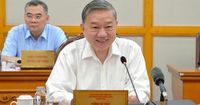As Thailand embarks on a journey to draft a new constitution, citizens from the southern provinces are voicing their opinions and hopes for a more inclusive and effective governance structure. On May 3, 2025, the Interior Ministry officials announced their progress on initiatives aimed at educating the public about constitutional matters, as part of a broader effort to address the challenges posed by the 2017 constitution.
The initiative, led by the IPAM group, commenced on April 24, 2025, under the banner “Constitutional Thai.” This activity involves a comprehensive tour across 77 provinces to gather public feedback for the forthcoming constitution. So far, the group has successfully reached six provinces including Surathani, Nakhon Sri Thammarat, Phatthalung, and Songkhla, with plans to continue their journey in the southern region.
During these gatherings, citizens have the opportunity to engage in discussions, participate in cultural performances, and express their views on pressing social issues stemming from the current constitution. One notable event took place at the Green Market in Pattani, where attendees from various age groups shared their thoughts on constitutional reform. Many expressed concerns about ongoing violence in the southern border provinces, with one participant stating, “I don’t want unrest in the three southern border provinces.”
Others, particularly from Songkhla, emphasized the need for local governance reforms, advocating for the decentralization of power and the elimination of the Senate system. They called for a more efficient and transparent electoral process. In Phatthalung, citizens raised issues related to the cost of living, particularly for individuals with disabilities, urging for a reduction in utility expenses and better oversight of public services.
The Interior Ministry aims to alleviate conflicts arising from the existing constitutional framework while fostering collaboration among citizens to create a new version. The upcoming events in the southern provinces are slated as follows: Narathiwat on May 4, Yala on May 5, Satun on May 6, Trang on May 7, Phuket on May 9, Phang Nga on May 13, Ranong on May 14, and Chumphon on May 15.
In tandem with these developments, the Politburo and the Government have been actively consolidating administrative structures at both provincial and communal levels. This effort is designed to streamline governance and enhance service delivery to the public. As of now, the number of administrative agencies is expected to decrease significantly, with projections indicating a reduction from 10,035 local governance units to approximately 3,320, representing a 66.91% decrease.
Furthermore, the administrative titles at local levels will see a substantial reduction, with around 18,440 positions being eliminated. This restructuring aims to create a more efficient government that can respond effectively to the needs of its citizens.
In light of these changes, the government has emphasized the importance of public engagement and feedback. Local authorities are expected to facilitate discussions and ensure that the voices of the citizens are heard in the decision-making processes. The aim is to build a transparent and accountable governance structure that resonates with the public’s needs and aspirations.
The consolidation process is not limited to administrative structures; it also involves enhancing the roles of social and political organizations. The Politburo has mandated that these organizations engage more closely with the community, thereby fostering a sense of partnership and collaboration that was previously lacking.
As the constitutional reform efforts unfold, the government is keen on leveraging technology and digital transformation to improve administrative efficiency. This initiative is seen as crucial in ensuring that the new governance model is not only effective but also adaptable to the changing needs of society.
In summary, the ongoing discussions about the new constitution and the administrative restructuring reflect a significant shift in Thailand’s approach to governance. By actively involving citizens in the constitutional process and streamlining administrative functions, the government aims to create a more inclusive and responsive political environment.
As these initiatives progress, it remains to be seen how effectively they will address the challenges posed by the existing constitutional framework and whether they will genuinely reflect the will of the people.


